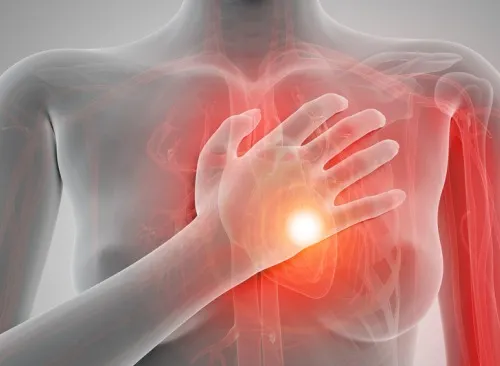How to Deal with a Heart Attack if You're Alone

The mere thought that we could suffer a heart attack at any moment is something that may fill us with fear. We know that in most cases its consequences can be fatal.
However, what should worry us most is not being prepared for a case like this, especially if it happens when we’re alone. Knowing how to react to the symptoms of a heart attack can be decisive in saving our lives.
In many cases, it’s difficult to act when we’re alone. However, if we take into account some recommendations, we can have more chances to survive and receive professional care in time.
Is a heart attack the same as a cardiac arrest?

Before giving you the recommendations to survive a heart attack if you’re alone, we must clarify something. A heart attack and cardiac arrest are not the same things.
It’s very common to see how people make the mistake of believing that both are synonymous with the same problem. They’re not, and it’s good to know this.
Both cardiac arrest and myocardial infarction (the correct medical term for a heart attack) are caused by problems with blood circulation and the supply to the heart. However, the two differ in their respective modes of occurrence.
Cardiac arrest
A cardiac arrest occurs when our body’s blood circulation decreases. This causes the contractions of the heart to become irregular or weaker.
As a result, all parts of our body stop receiving adequate oxygen supply. And, because of this, the person loses consciousness, as the brain doesn’t receive the necessary amount of oxygen.
Read: Nutrients and Exercises to Maintain a Healthy, Clean, and Strong Liver
Heart attacks
A heart attack, or myocardial infarction, occurs when the blood flow is cut off in a particular area of the heart, usually caused by an arterial blockage.
As a result, the cells in this area of our heart begin to die. So, if left untreated, over time this disruption in the blood and oxygen supply to the heart can be fatal. It could cause serious damage to the heart muscle and tissues.
Finally, the symptoms that are associated with a heart attack often allow us to act in time. These are chest pain, shortness of breath, palpitations, excessive sweating, nausea, fatigue, or dizziness, among others.
How to act in the event of a heart attack
It’s important to know how to act if you experience heart problems when you’re alone.Well, now that we’ve clarified the differences between cardiac arrest and a heart attack, we invite you to find out how you should act. The goal is to survive a heart attack if you’re alone.
It’s important to note that there is no single effective way to survive a heart attack. However, these tips can make a difference.
What to do at the first sign of symptoms
First of all, you should call an emergency number. Don’t wait. Do it as soon as you start to feel physical discomfort and pain in the heart area that might be suspicious.
If you’ve already been diagnosed with any type of heart disease, don’t hesitate. Contact the medical center where you are receiving treatment. If you’re driving a car and start to feel symptoms, pull over immediately and call 911 as soon as possible.
Do this no matter how close you may be to a medical facility or hospital. Don’t attempt to drive the car yourself for any reason. You could pass out at any time while driving, and it could end badly for you and even others.
We think you’d like to read: The Benefits of Elevating Your Legs for 20 Minutes Per Day
What do to while waiting for emergency services
Are you undergoing medical treatment to control heart disease?
If so, you may have some type of over-the-counter beta-blocker medication nearby. If so, take a pill while you wait for help to arrive.
If this is your first time, take aspirin as soon as possible and chew it well. Aspirin helps prevent blood clots from forming. This will help improve blood flow by relaxing the arteries. This will also be very helpful in keeping the problem from getting worse while help arrives.
Important tips
- If possible, you should remain still to avoid overworking the already exhausted heart muscle.
- If you can, firmly pump the area of the chest where the heart is located with your hand to prevent the heart from stopping pumping blood. However, know that this is a very difficult thing to do when we have a heart attack. For this reason, it’s more effective if someone else does it for you.
- If you’re wearing tight clothing, loosen it to reduce the pressure on the area.
What to remember about CPR
After learning the steps for dealing with a heart attack if you’re alone, many of you may be wondering, why did we take the time to cover the difference between cardiac arrest and heart attack?
Well, chances are that in some type of email or website you may have come across information that seeks to teach you how to perform CPR. However, what they do not differentiate is that CPR is a method to apply in case of cardiac arrest. Therefore, that’s when it’s best applied.
In general, these types of chains or advice do not clarify the difference between the two problems. We hope you find this information helpful.
The key is to always seek emergency help as soon as possible.
All cited sources were thoroughly reviewed by our team to ensure their quality, reliability, currency, and validity. The bibliography of this article was considered reliable and of academic or scientific accuracy.
- Farré, A. L., & Miguel, C. M. (2009). Cómo se forma un trombo en las arterias coronarias y su prevención por Aspirina®. In Libro de la salud cardiovascular del Hospital Clínico San Carlos y la Fundación BBVA (pp. 269-278). Fundación BBVA. Available at: https://www.fbbva.es/microsites/salud_cardio/mult/fbbva_libroCorazon_cap29.pdf. Accessed 26/03/2020.
- MedlinePlus (2018). Ataque cardíaco. Available at: https://medlineplus.gov/spanish/ency/article/000195.htm. Accessed 26/03/2020.
- MedlinePlus (2019). Paro cardíaco. Available at: https://medlineplus.gov/spanish/cardiacarrest.html. Accessed 26/03/2020.
This text is provided for informational purposes only and does not replace consultation with a professional. If in doubt, consult your specialist.








